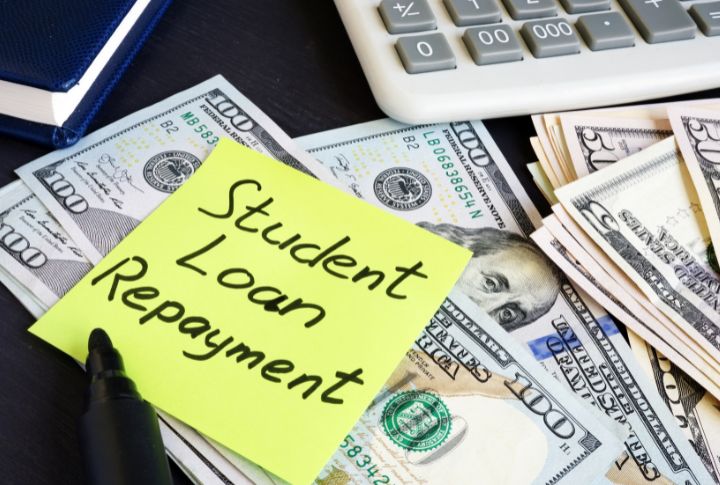
Student loans can be a launchpad to a fulfilling career but can also feel like a weight on your financial well-being. One major concern for borrowers is the impact of student loan debt on their credit scores. This informative guide will explore this topic in detail, helping you understand how a student loan can affect your creditworthiness, discuss the good and the bad of it, and offer tips to handle this aspect of your financial journey.
Demystifying Credit Scores: What They Are and Why They Matter

You can calculate your credit score by reviewing your credit history. It is a numerical indication of your creditworthiness. This score helps lenders determine whether you’ll be able to repay borrowed money, impacting your eligibility for loans, credit cards, and even insurance rates.
The Building Blocks of Your Score

Several factors contribute to your score, with the most significant being:
Payment History (35%): Making timely payments on all your debts, including student loans, is important.
Credit Utilization Ratio (30%): This ratio compares your credit card balances to your credit limits. Lower utilization is better.
Credit Age (15%): It is important to have a long credit history. Aim to open a credit card early and manage it responsibly.
Credit Mix (10%): Having different credit options, such as credit cards and student loans, can improve your credit score.
New Credit Inquiries (10%): Getting too many credit cards or loans within a short span of time can negatively affect your score.
On-Time Payments Are Your Ally

Consistent on-time payments on your loans are a major win for your score. Each on-time payment you make is reported to credit bureaus and contributes positively to your payment history. This consistent positive track record demonstrates your reliability in managing debt and makes you a more attractive borrower in the eyes of future lenders.
Student Loan Extends Your Credit History

If you haven’t had many credit cards or other loans, your student loans can play a key role in establishing your credit history. A longer history, even if it starts with student loans, generally translates to a higher score.
It Improves Your Credit Mix

Your credit mix refers to your variety of credit products. A healthy mix, including installment loans like student loans alongside credit cards (revolving credit), can positively impact your score.
Delinquency is a Downward Spiral

Missing student loan payments can lead to delinquency, severely damaging your credit score. It is defined as being 30 days past due on a payment.
Default: The Worst-Case Scenario

Defaulting on your loans, which means that you haven’t paid the installment in a long time, has the most detrimental impact on your score. This can severely limit your access to future credit, making it difficult to qualify for loans, credit cards, or even certain types of insurance. Defaults stay on your report for a staggering seven years, making it challenging to rebuild your score quickly. Once you default, your loan may be transferred to a collection agency. These agencies are aggressive in collecting debts and may add additional fees and penalties, further increasing your financial burden.
Strategies for Managing Student Loan Debt and Maintaining a Good Score

A high score is important for multiple reasons, including a higher credit limit, insurance, and better interest rates. You can take the steps described in the slides ahead of time to ensure your report gets a good score.
Prioritize On-Time Payments

Most lenders and loan servicers offer automatic payment options. Schedule automatic payments for the minimum amount due (or more if possible) to avoid late fees and ensure timely payments are reported to credit bureaus.
Tackle Delinquency Quickly

If you’re already delinquent, contact your loan servicer immediately to discuss repayment options and prevent further damage to your score.
Consider Loan Consolidation or Refinancing

Consolidating multiple loans can simplify repayment and potentially lower your interest rate, improving your credit utilization ratio. Refinancing may also offer lower rates, but federal loan benefits might be lost.
Don’t Neglect Other Credit Responsibilities

Manage credit cards responsibly. The aim should be to keep your credit utilization ratio (CUR) low. This means not maxing out your cards and paying your balance in full each month.
Utilize Your Student Loans to Build Credit Mix

It is true that student loans can be burdensome, but they also contribute to your credit mix, which can be beneficial if managed well. Student loans are considered installment loans, unlike credit cards, which are revolving credit. Having both installment loans and revolving credit shows you can manage different repayment structures, making you a more attractive borrower to lenders.
Be Strategic About New Applications

Avoid applying for too many credit cards or loans in a short period, as this can negatively impact your score due to inquiries.
Monitor Your Report Regularly

Regularly check your report for errors and dispute any inaccuracies to maintain a fair score. Credit reporting errors are more common than you might think. For example, If you see unfamiliar accounts or inquiries on your report, it could be a red flag that someone is using your information to open new lines of credit. Early detection allows you to address such issues timely and minimize damage.
Seek Professional Help

If you’re struggling with student loan payments, speak with a professional for specific guidance. With the help of a credit counselor, you can understand your financial situation, develop a personalized debt management plan, and even negotiate with your loan servicers on your behalf.
